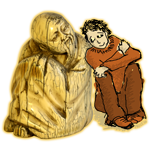
Quest & Questions
A Mad In Pursuit Project
- mad in pursuit >
- favorite themes >
- quest & questions>
- here
Hours
The goal here would be to have logical chunks to the ordinary day, which would provide regular opportunities to practice all the skills required by the Four-Box Flow.
Early morning (Matins, pre-dawn). Meditation and study. Practice for Quiet
Morning (Lauds). Writing practice
Mid-morning (Terce), Mid-day (Sext), Midafternoon (None). Plan for joint activities, practical necessities. Projects.
Evening (Vespers). Currently this is centered around the television -- news, DVR episodes, movies. Together time.
Night (Compline) I often fritter this time away with more TV, games, brainless activity. I feel best if I clean up my project messes, reflect on the day and organize for the next day, including jotting down notes. Best to diary here, instead of wasting matin time on recapping yesterday.
Catholic Liturgy of Hours, for structure and inspiration
Major hours
The major hours consist of the Office of Readings (formerly Matins), Morning (or Lauds) and Evening Prayer (or Vespers).
The Office of Readings consists of:
- a hymn
- one or two long psalms divided into three parts
- a long passage from scripture, usually arranged so that in any one week, all the readings come from the same text
- a long hagiographical passage, such as an account of a saint's martyrdom, or a theological treatise commenting on some aspect of the scriptural reading, or a passage from the documents of the Second Vatican Council
- on nights preceding Sundays and feast days, the office may be expanded to a vigil by inserting three Old Testament canticles and a reading from thegospels
- the hymn Te Deum (solemnities, feasts, and Sundays outside of Lent)
- the concluding prayer
- a short concluding verse (especially when prayed in groups)
The character of Morning Prayer is that of praise; of Evening Prayer, that of thanksgiving. Both follow the same format:
- a hymn, composed by the Church
- two psalms, or one long psalm divided into two parts, and a scriptural canticle (taken from the Old Testament in the morning and the New Testament in the evening)
- a short passage from scripture
- a responsory, typically a verse of scripture, but sometimes liturgical poetry
- a canticle taken from the Gospel of Luke: the Canticle of Zechariah (Benedictus) for morning prayer, and the Canticle of Mary (Magnificat) for evening prayer
- intercessions, composed by the Church
- the Lord's Prayer
- the concluding prayer, composed by the Church
- a blessing given by the priest or deacon leading Morning or Evening Prayer, or in the absence of clergy and in individual recitation, a short conclusion
Minor hours
The daytime hours follow a simpler format, like a very compact form of the Office of Readings:
- a hymn
- three short psalms, or, three pieces of longer psalms; in the daytime hours it is usual to begin one part of the longest psalm, psalm 119
- a very short passage of scripture, followed by a responsorial verse
- the concluding prayer
- a short concluding verse (especially when prayed in groups)
Night prayer has the character of preparing the soul for its passage to eternal life:
- an examination of conscience
- a hymn
- a psalm, or two short psalms, or simply Psalm 91
- a short reading from scripture
- the responsory In manus tuas, Domine (Into Your Hands, Lord)
- the Canticle of Simeon, Nunc dimittis, from the Gospel of Luke, framed by the antiphon Protect us, Lord
- a concluding prayer
- a short concluding blessing
- a hymn to Mary, the mother of Jesus
In each office, the psalms and canticle are framed by antiphons, and each concludes with the traditional Catholic doxology.
*Resource: Canonical hours, wikipedia